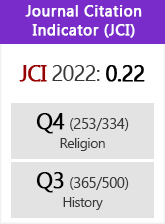Una posible influencia: la Epístola de la Contemplación (Risālat al-iʿtibār) de Ibn Masarra (m. 931) y Ḥayy ibn Yaqẓān (Risālat Ḥayy ibn Yaqẓān) de Ibn Ṭufayl’s (m. 1185)
DOI:
https://doi.org/10.3989/alqantara.2023.002Palabras clave:
Ibn Masarra, Epístola de la Contemplación (Risālat al-iʿtibār), filosofía de al-Andalus, Ḥayy ibn Yaqẓān, Ibn ṬufaylResumen
Este artículo plantea la posibilidad de considerar la Epístola de la Contemplación (Risālat al-iʿtibār) de Ibn Masarra como otra posible influencia en la famosa novela filosófica de Ibn Ṭufayl, Ḥayy ibn Yaqẓān. Las características compartidas en los argumentos básicos de las dos obras sobre la compatibilidad de la razón y la revelación como los dos caminos para alcanzar el conocimiento y su similar uso epistemológico del concepto de fiṭra como la base del ascenso racional demuestran que la epístola de Ibn Masarra constituyó una fuente para la historia ideada por Ibn Ṭufayl. Sin embargo, una comparación de ambas obras demuestra diferencias importantes en sus concepciones del fin de la contemplación y de la fiṭra y, de ahí, en las ideas de cada autor acerca de la paridad entre razón y revelación. Considerando tanto sus características compartidas más significativas como sus diferencias más importantes, este artículo plantea la posible existencia de una conexión significativa entre los dos textos andalusíes. Dado que hay una escasez relativa de datos históricos sobre los dos autores, este artículo no aborda la historia material de ninguno de los textos o las circunstancias históricas de sus autores. En cambio, concluye que, a pesar de los matices divergentes entre las dos obras, sus paralelos justifican considerar la epístola de Ibn Masarra como otra influencia posible en la estructura y objetivos de la novela de Ibn Ṭufayl.
Descargas
Citas
Asin Palacios, Miguel, The Mystical Philosophy of Ibn Masarra and His Followers, Leiden, Brill, 1978. https://doi.org/10.1163/9789004661769
Bashier, Salman H., The Story of Islamic Philosophy, Albany, State University of New York Press, 2011.
Ben-Zaken, Avner, Reading Ḥayy ibn Yaqẓān, Baltimore, John's Hopkins Press, 2011. https://doi.org/10.1353/book.492
Brown, Vahid, "Muḥammad b. Masarra al-Jabalī and His Place in Medieval Islamicate Intellectual History: Towards a Reappraisal", unpublished paper, Reed College, 2006.
Casewit, Yousef, The Mystics of al-Andalus: Ibn Barrājan and Islamic Thought in the Twelfth Century, Cambridge, Cambridge University Press, 2017. https://doi.org/10.1017/9781316882252
Conrad, Lawrence (ed.), The World of Ibn Ṭufayl: Interdisciplinary Perspectives on Ḥayy ibn Yaqẓān, Leiden-New York-Köln, Brill, 1996. https://doi.org/10.1163/9789004452664
De Callataӱ, Godefroid, "Did the Rasāʾil Ikhwān al-Ṣafāʾ Inspire Ibn Ṭufayl to His Ḥayy ibn Yaqdhān?", Ishraq: Islamic Philosophy Yearbook, 3 (2012), pp. 82-89.
De Callataӱ, Godefroid, "Philosophy and Bāṭinism in al-Andalus: Ibn Masarra's Risālat al-Iʿtibār and the Rasāʾil Ikhwān al-Ṣafāʾ", Jerusalem Studies in Arabic and Islam, 41 (2014), pp. 261-312.
Ebstein, Michael, "Ibn Masarra", in Kate Fleet, Gudrun Krämer, Denis Matringe, John Nawas, & Devin J. Stewart (eds.), The Encyclopaedia of Islam THREE, Boston, Brill, 2007.
Ebstein, Michael, Mysticism and Philosophy in al-Andalus: Ibn Masarra, Ibn al-'Arabi and the Isma'ili Tradition, Leiden-Boston, Brill, 2014. https://doi.org/10.1163/9789004255371
Ekthiar, Shelly, "Ḥayy ibn Yaqẓān: The 18th Century Reception of an Oriental", Studies on Voltaire and the Eighteenth Century, 302 (1992), pp. 217-245.
Fierro, Maribel, "Ibn Ṭufayl's Ḥayy ibn Yaqẓān: An Almohad Reading", Islam and Christian-Muslim Relations, 31, 4 (2020), pp. 385-405. https://doi.org/10.1080/09596410.2020.1846448
Gauthier, Léon, Hayy ben Yaqdhān: Roman philosophique d'Ibn Thofail, Beirut, Imprimerie Catholique, 1936.
Griffel, Frank, "Al-Ghazālī's Use of 'Original Human Disposition' (Fiṭra) and Its Background in the Teachings of al-Fārābī and Avicenna", The Muslim World, 102, 1 (2011), pp. 1-32. https://doi.org/10.1111/j.1478-1913.2011.01376.x
Gutas, Dimitri, "Ibn Ṭufayl on Ibn Sīnā's Eastern Philosophy", Oriens, 34 (1994), pp. 222-241. https://doi.org/10.1163/19606028_032_02-20
Hawi, Sami, "Ibn Ṭufayl's Appraisal of His Predecessors", Islamic Studies, 13 (1974), pp. 135-177.
Hoover, Jon, "Fiṭra", in Kate Fleet, Gudrun Krämer, Denis Matringe, John Nawas & Devin J. Stewart (eds.), The Encylopaedia of Islam THREE, Boston, Brill, 2007.
Hourani, George F., "The Principal Subject of Ibn Ṭufayl's Ḥayy ibn Yaqẓān", Journal of Near Eastern Studies, 15 (1956), pp. 40-46. https://doi.org/10.1086/371308
Hughes, Aaron, The Texture of the Divine: Imagination in Medieval Islamic and Jewish Thought, Bloomington, Indiana University Press, 2003.
Ibn Masarra, "Edición crítica de la Risālat al-iʿtibār de Ibn Masarra de Córdoba", Pilar Garrido Clemente (ed.), Miscelánea de estudios àrabes y hebraicos, 56 (2007), pp. 81-104.
Ibn Ṭufayl, Hayy ibn Yaqẓān, Lenn Evan Goodman (trans.), Chicago, University of Chicago Press, 2015.
Idris, Murad, "Producing Islamic Philosophy: The Life and Afterlives of Ibn Ṭufayl's Ḥayy ibn Yaqẓān in Global History, 1882-1947", European Journal of Political Theory, 15, 4 (2016), pp. 382-403. https://doi.org/10.1177/1474885116666032
Kukkonen, Taneli, Ibn Tufayl: Living the Life of Reason, London, Oneworld, 2014.
Kukkonen, Taneli, "Al-Ghazālī on Error", in Taneli Kukkonen & Frank Griffel (eds.), Islam and Rationality: The Impact of al-Ghazālī (vol. 2), Leiden, Brill, 2016, pp. 3-31. https://doi.org/10.1163/9789004307490_002
Mojaddedi, Jawid, "Annihilation and Abiding in God", in Kate Fleet, Gudrun Kraemer, Denis Matringe, John Nawas & Devin J. Stewart (eds.), The Encylopaedia of Islam THREE, Boston, Brill, 2007.
Morris, James W., "Ibn Masarra: A Reconsideration of the Primary Sources", unpublished paper, Harvard University, 1973.
Ockley, Simon, The History of Ḥayy ibn Yaqẓān, London, Chapman and Hall, 1929.
Pococke, Edward, Philosophus autodidactus: sive Epistola Abi Giaapher Ebn Tophail de Hai Ebn Yokdan, Oxford, 1671.
Stroumsa, Sarah, "Avicenna's Philosophical Stories: Aristotle's Poetics Reinterpreted", Arabica, 39, 2 (1992), pp. 183-206. https://doi.org/10.1163/157005892X00166
Stroumsa, Sarah, "Ibn Masarra and the Beginnings of Mystical Thought in al-Andalus", in Peter Schaefer (ed.), Wege Mystischer Gotteserfahrung: Mystical Approaches to God, Berlin-Boston, Oldenbourg, 2009, pp. 97-112. https://doi.org/10.1524/9783486594713-008
Stroumsa, Sarah, "Thinkers of 'This Peninsula': Toward an Integrative Approach to the Study of Philosophy in al-Andalus", in David M. Freidenreich & Miriam Goldstein (eds.), Beyond Religious Borders: Interaction and Intellectual Exchange in the Medieval World, Philadelphia, University of Pennsylvania Press, 2011, pp. 44-53. https://doi.org/10.9783/9780812206913.44
Stroumsa, Sarah, "Comparison as a Multifocal Approach: The Case of Arabic Philosophical Thought", in Guy G. Stroumsa (ed.), Comparative Studies in the Humanities, Jerusalem, The Israel Academy of Sciences and Humanities, 2018, pp. 133-152.
Stroumsa, Sarah, Andalus and Sefarad, Princeton, Princeton University Press, 2019. https://doi.org/10.23943/princeton/9780691176437.001.0001 PMCid:PMC7395710
Stroumsa, Sarah, "The Makeover of Ḥayy", Oriens, 49 (2021), pp. 1-34. https://doi.org/10.1163/18778372-20210002
Stroumsa, Sarah & Sviri, Sara, "The Beginnings of Mystical Philosophy", Jerusalem Studies in Arabic and Islam, 36 (2009), pp. 201-253.
Von Doetinchem de Rande, Raissa, "An Exceptional Sage and the Need for the Messenger: The Politics of Fiṭra in a 12th-Century Tale", Arabic Sciences and Philosophy, 29, 2 (2019), pp. 207-229. https://doi.org/10.1017/S0957423919000043
Publicado
Cómo citar
Número
Sección
Licencia
Derechos de autor 2023 Consejo Superior de Investigaciones Científicas (CSIC)

Esta obra está bajo una licencia internacional Creative Commons Atribución 4.0.
© CSIC. Los originales publicados en las ediciones impresa y electrónica de esta Revista son propiedad del Consejo Superior de Investigaciones Científicas, siendo necesario citar la procedencia en cualquier reproducción parcial o total.Salvo indicación contraria, todos los contenidos de la edición electrónica se distribuyen bajo una licencia de uso y distribución “Creative Commons Reconocimiento 4.0 Internacional ” (CC BY 4.0). Puede consultar desde aquí la versión informativa y el texto legal de la licencia. Esta circunstancia ha de hacerse constar expresamente de esta forma cuando sea necesario.
No se autoriza el depósito en repositorios, páginas web personales o similares de cualquier otra versión distinta a la publicada por el editor.














